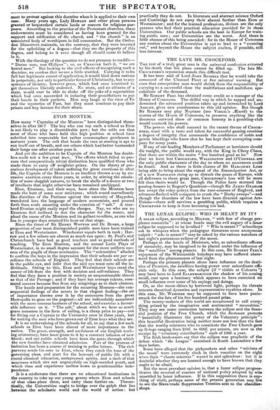ETON MONTEM.
How many " Captains of the Montem " have distinguished them- selves in after life ? The boy who can top such a school as Eton is not likely to play a discreditable part ; but the odds are that most of those who have held this high position at school have subsided into respectable but rather commonplace gentlemen in matures years. The colt that heads the race at starting is apt to run itself out of breath, and see others which had better husbanded their lungs one after another pass it. And yet the ambition to be Captain of the Montem has doubt- less made not a few great men. The efforts which failed to pro- cure that comparatively trivial distinction have qualified those who made them to carry off weightier prizes. On the theory of pre- cocious development of talent unfitting for great exertions in after life, the Captain of the Montem is an intellect thrown away by ex- cessive exertion every three years, in order, by stirring the emula- tion of more sluggish natures, to break the shells of a dozen or two of intellects that might otherwise have remained unchipped. Eton, Etonians, and their ways, have since the Montem been made the butt of some sour strictures; which sound marvellously like diatribes of the Puritans against the enormity of Maypoles, translated into the language of modern economists, and poured forth from souls smarting under the exaction of " salt." A true- bred Etonian might easily repel the charges. Nay, we who are no Etonians feel inclined to don the character for the nonce, and plead the cause of the Montem and its gallant revellers, as one who has in younger days strutted his hour on that stage.
Since the times of Sir HENRY Worron and Dr. BUSBY, a large proportion of our most distinguished public men have been trained at Eton and Westminster. Winchester equals both in rank ; Har-
row and a few others are almost as much run upon ; St. Paul's and Christchurch have had as good teachers and as good methods of teaching. The Eton Montem, and the annual Latin Plays of Westminster, in no small degree account for the more uniform suc- cess of the pupils of those seminaries. The " solemnities " alluded to confirm the boys in the impression that their schools are par ex- cellence the schools of England. They feel that their schools are in the public eye, and infer that the said eye must note all the in- dividuals. Owing to this, Eton and Westminster boys tread the career of life from the first with decision and self-reliance. They feel that they have a position in society as unquestionable almost as that of the Peerage ; and if they have but average talents, com- mand success because free from any misgivings as to their chances. The bustle and preparation for the recurring Montem—the con- sequential feelings of the actors in that elegant fooling—the air of importance thrown over it by the concourse from the great Metropolis to gaze on the pageant—all are indissolubly associated with the more onerous business of the school, and exercise a favour-
able influence on it. "The salt," about which we hear so much
grave nonsense in the form of railing, is a cheap price to pay—not for fitting out a Captain to the University once in three years, but for making the men who have grown out of Eton boys what they are.
It is no undervaluing of the schools for all, to say that a few such schools as Eton have been almost of more importance to the nation. The grace, strength, and usefulness of our English work- ing aristocracy, have been to it by a constant infusion of new blood; and our public schools have been the gates through which the new families have obtained admission. Part of the process of imitation has been a course of training in polite letters. The rich parvenu sends his sons to Eton, where they catch the tone of the -governing class, and start for the honours of public life with a eound classical education, undepressed spirits, and a dash of that sauciness which sits not ungracefully on high-mettled youth, and 'which time and experience mellow down to gentlemanlike inde- pendence. It is a misfortune that there are no educational institutions in the country to take up our young gentry where Eton and schools of that class place them, and carry them further on. Theore- 4ically, the Universities ought to bridge over the gnlph that lies ,between the scholastic world and the world of action : but practically they do not. In literature and abstract science Oxford and Cambridge do not carry their alumni further than Eton or Westminster ; and for the learned professions, divines are the only persons who find their practical education provided for in these Universities. Our public schools are the best in Europe for train- ing public men ; our Universities are the worst. And there is little chance of this being amended : for in the House of Commons any motion about the Universities is apt to lead to a "counting out," and beyond the House the subject excites, if possible, still less interest.


























 Previous page
Previous page